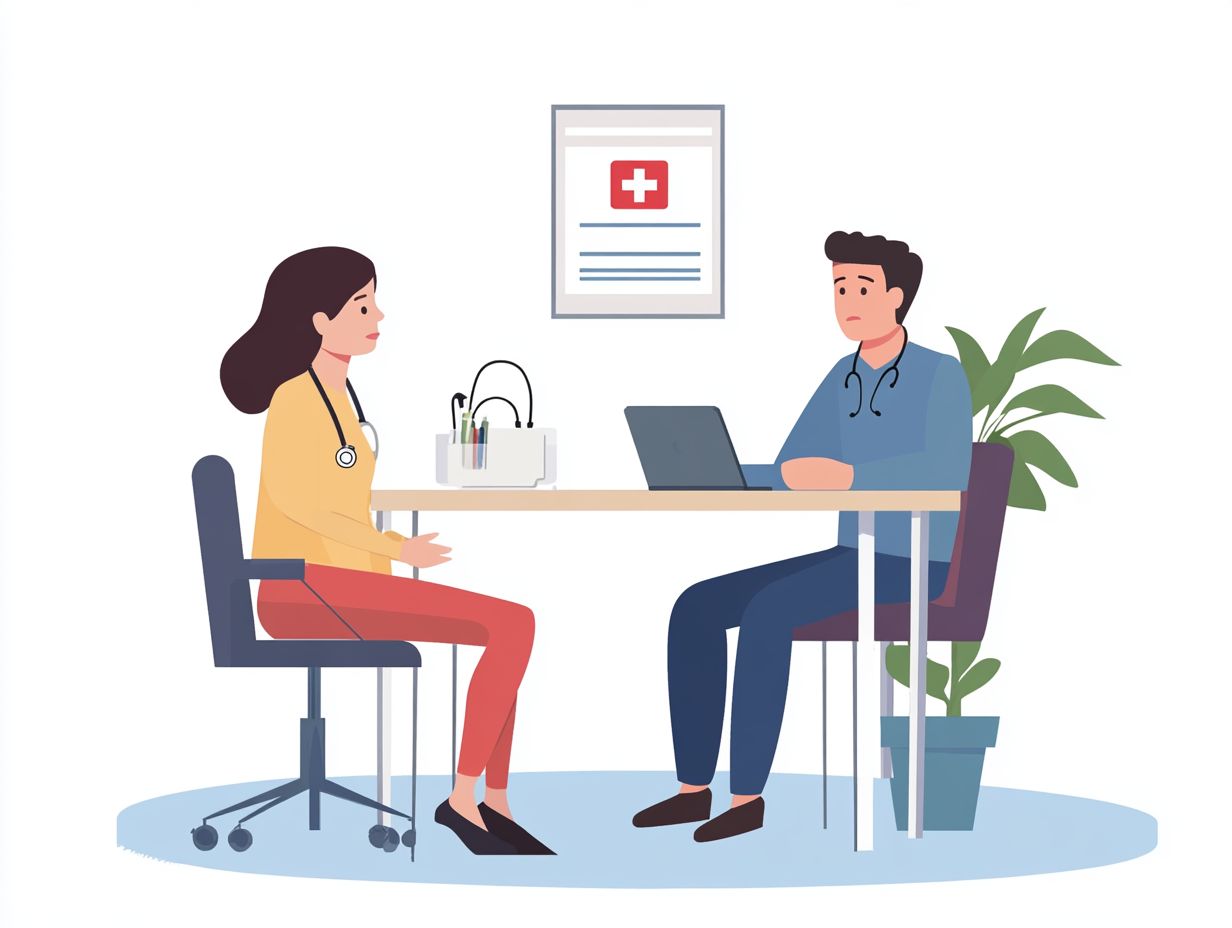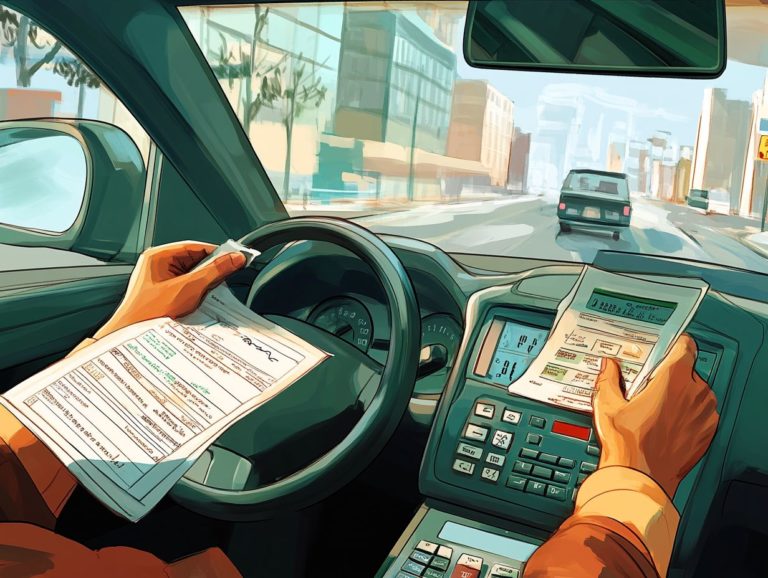Insurance for High-Risk Drivers with Medical Conditions
Navigating car insurance can be daunting, especially for high-risk drivers dealing with medical conditions. Understanding what makes someone high-risk can improve your chances of finding the right coverage.
This article examines what defines high-risk driving and the medical conditions that can impact your insurance. You ll also discover specialized insurance options that cater to your unique needs.
We ll discuss key factors to consider when choosing insurance and practical steps to help lower your premiums.
Whether you are classified as a high-risk driver or want to learn more, this guide will empower you to make confident insurance decisions.
Contents
- Key Takeaways:
- Understanding High-Risk Drivers
- Medical Conditions that Contribute to High-Risk Status
- Insurance Options for High-Risk Drivers
- Factors to Consider When Choosing Insurance
- Steps to Take to Lower Insurance Premiums
- Frequently Asked Questions
- What is insurance for high-risk drivers with medical conditions?
- Why do high-risk drivers with medical conditions need special insurance?
- What types of medical conditions are considered high-risk for drivers?
- How does insurance for high-risk drivers with medical conditions differ from regular car insurance?
- Can high-risk drivers with medical conditions still get affordable insurance?
- What should high-risk drivers with medical conditions consider when looking for insurance?
Key Takeaways:

- Insurance options for high-risk drivers with medical conditions include specialized policies from select companies.
- Consider coverage, cost, and company reputation to find the best fit for your needs.
- You may lower premiums by improving your driving record and managing any health conditions.
Understanding High-Risk Drivers
Understanding high-risk drivers is essential for anyone navigating car insurance, as these individuals often face challenges in securing affordable coverage. For more insights, check out what is guaranteed insurability for high-risk drivers?
Insurance companies label these drivers as high-risk based on their driving records and claims data. This can lead to higher car insurance premiums and may require specialized policies designed for high-risk drivers.
Definition and Causes
High-risk drivers are those whose driving behavior suggests a higher chance of filing claims. Factors like frequent traffic violations, accidents, and poor credit scores can contribute to this classification.
Medical conditions, such as epilepsy or severe anxiety, can affect focus and reaction times, increasing accident risk. Risky behaviors, like drinking and driving, also play a significant role.
According to the National Highway Traffic Safety Administration, high-risk drivers account for nearly 30% of all accidents. This leads to higher insurance premiums, highlighting the importance of safe driving practices.
Medical Conditions that Contribute to High-Risk Status
Some medical conditions can greatly impact a driver s risk level. Conditions like epilepsy, severe anxiety, and sleep disorders can hinder safe driving.
Insurance providers consider these factors when evaluating car insurance coverage and premiums. This can affect how long it takes to qualify for lower rates based on your driving record.
Common Health Conditions and Their Impact

Several common health conditions can greatly impact your safety as a driver and elevate your status as a high-risk individual. Conditions like diabetes, heart disorders, and neurological issues can impair your driving abilities, increasing the likelihood of incidents on the road. Understanding uninsured motorist coverage for high-risk individuals is crucial, as it affects your driving record and can lead to higher insurance premiums.
If you have untreated diabetes, sudden drops in blood sugar could leave you feeling dizzy or confused definitely not ideal when you’re behind the wheel. Heart disorders can also lead to fatigue or unexpected health crises while driving, sharply raising the risk of accidents.
Neurological conditions, such as epilepsy, can trigger seizures, leaving you unable to maintain control of your vehicle. These health-related factors jeopardize your personal safety and complicate your car insurance applications.
Insurers often assess these risks in numbers, which can mean increased premiums for you. Therefore, it s essential to provide full disclosure about your health conditions. This will help you avoid potential legal issues and ensure you receive the appropriate coverage.
Insurance Options for High-Risk Drivers
High-risk drivers present a distinct set of needs when it comes to insurance options. Specialized policies are crafted to suit their unique circumstances. Many insurance companies now offer high-risk auto insurance specifically designed for those with a troubled driving history, ensuring that essential car insurance coverage remains accessible despite your higher risk profile.
These policies often include features like accident forgiveness, where insurers overlook one accident, and customized claims processes, tailored to meet the specific requirements of these drivers.
Specialized Insurance Companies and Policies
Several specialized insurance companies cater specifically to high-risk drivers, providing unique policies designed to meet their distinct needs. Providers like Geico and American Family offer competitive car insurance options with features tailored for those with a history of accidents or driving violations.
Besides these well-known names, companies such as The General and Dairyland Insurance offer flexible payment plans and discounts for safe driving over time. This encourages you to adopt responsible habits behind the wheel.
As a high-risk driver, you can explore customizable policies that include liability coverage, collision, and comprehensive options, along with roadside assistance services that provide peace of mind.
Some insurers also offer driver education programs aimed at improving your skills, which can lead to lower premiums once you ve successfully completed the course. Each of these options reflects an understanding of the unique challenges faced by high-risk individuals. This enables you to secure essential protection while promoting safer driving practices.
Factors to Consider When Choosing Insurance
When choosing car insurance, especially as a high-risk driver, it s essential to weigh several critical factors to find the best fit for your unique needs. Consider the type and extent of coverage available, the overall cost of premiums, and the reputation of the insurance providers.
Pay attention to their customer service ratings and claims processes, as these elements can significantly impact your experience. Act now to secure your safety on the road!
Coverage, Cost, and Reputation

When considering insurance, the coverage, cost, and reputation of a provider are crucial elements for high-risk drivers like you. While high coverage limits can offer essential protection, they often come with a steeper price tag.
This makes it important to closely examine the insurance methodologies employed by various providers. As you navigate the complexities of insurance options, take time to explore how different companies structure their coverage.
Look for specific endorsements or add-ons that cater to your unique needs, such as accident forgiveness or rental car coverage. These can make a significant difference in your policy.
A thorough cost analysis is essential, not just in terms of premiums but also considering deductibles, which is the amount you pay out of pocket before insurance kicks in, and any hidden fees that might catch you off guard.
You can gauge a provider’s reputation through customer reviews and ratings on various platforms, along with financial stability indicators from trusted rating agencies.
By comparing multiple insurers, you ll be able to identify who offers competitive advantages and responsive customer service. This will enable you to make informed decisions that best suit your situation.
Steps to Take to Lower Insurance Premiums
Are you a high-risk driver looking to lower your insurance premiums? You have several proactive steps at your disposal to lower your insurance premiums, making coverage more affordable.
By improving your driving record and steering clear of violations, you can enhance your appeal to insurers. Seek out available insurance discounts and look for policies with accident forgiveness.
These actions can substantially influence your overall insurance costs, ultimately providing you with greater peace of mind.
Improving Driving Record and Health Condition Management
How can you positively influence your car insurance rates? Improving your driving record and effectively managing any health conditions are essential steps.
By addressing factors related to your driving history and working on managing your health, you can gradually reduce your risk profile and potentially qualify for lower premiums. You can take exciting steps right now, like enrolling in driver improvement courses.
These courses not only enhance your driving skills but also showcase your commitment to safety. Practicing safe driving habits, like adhering to speed limits and avoiding distractions, will further contribute to a cleaner record.
On the health side, maintaining a healthy lifestyle and scheduling regular check-ups can help you gain better control over conditions that might impair your driving.
By implementing these measures, you not only boost your chances of securing better insurance rates but also contribute to a safer driving environment for everyone on the road.
Frequently Asked Questions
What is insurance for high-risk drivers with medical conditions?

Insurance for high-risk drivers with medical conditions is a type of coverage specifically designed for individuals with pre-existing medical conditions that may make them a higher risk to insure. This type of insurance typically offers understanding high-risk driver insurance options, along with additional coverage and assistance for medical expenses related to their condition.
Why do high-risk drivers with medical conditions need special insurance?
High-risk drivers with medical conditions may require special insurance because their pre-existing conditions may make them more susceptible to accidents or other health issues while driving. Exploring the best low-cost insurance policies for high-risk drivers can provide them with the necessary coverage and support in case of an emergency.
What types of medical conditions are considered high-risk for drivers?
Medical conditions that are considered high-risk for drivers can vary, but common examples include heart disease, epilepsy, diabetes, and vision impairments. These conditions may increase the likelihood of accidents or other health concerns while driving.
How does insurance for high-risk drivers with medical conditions differ from regular car insurance?
Insurance for high-risk drivers with existing health issues is different from regular car insurance. It offers extra coverage, including understanding liability coverage for high-risk drivers, and help with medical expenses related to these health issues.
Can high-risk drivers with medical conditions still get affordable insurance?
Yes, they can find affordable options. Researching and comparing quotes is key to securing the best rates and coverage for their unique situation.
What should high-risk drivers with medical conditions consider when looking for insurance?
High-risk drivers should think about their health issues and budget when searching for insurance. Understanding the role of insurance brokers for high-risk drivers can also be beneficial. Disclosing all health issues to the insurance provider is crucial for proper coverage.






